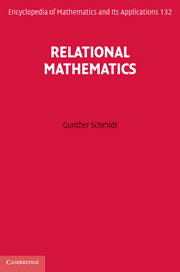Book contents
- Frontmatter
- Contents
- Notes on illustrations
- Preface
- 1 Introduction
- PART I REPRESENTATIONS OF RELATIONS
- PART II OPERATIONS AND CONSTRUCTIONS
- PART III ALGEBRA
- 8 Relation algebra
- 9 Orders and lattices
- 10 Rectangles, fringes, inverses
- 11 Concept analysis
- PART IV APPLICATIONS
- PART V ADVANCED TOPICS
- Appendix A Notation
- Appendix B Proofs postponed from Part II
- Appendix C Algebraic visualization
- Appendix D Historical annotations
- References
- Symbols
- Index
8 - Relation algebra
from PART III - ALGEBRA
Published online by Cambridge University Press: 05 May 2013
- Frontmatter
- Contents
- Notes on illustrations
- Preface
- 1 Introduction
- PART I REPRESENTATIONS OF RELATIONS
- PART II OPERATIONS AND CONSTRUCTIONS
- PART III ALGEBRA
- 8 Relation algebra
- 9 Orders and lattices
- 10 Rectangles, fringes, inverses
- 11 Concept analysis
- PART IV APPLICATIONS
- PART V ADVANCED TOPICS
- Appendix A Notation
- Appendix B Proofs postponed from Part II
- Appendix C Algebraic visualization
- Appendix D Historical annotations
- References
- Symbols
- Index
Summary
Concerning syntax and notation, everything is now available to work with. We take this opportunity to have a closer look at the algebraic laws of relation algebra. In particular, we will be interested in how they can be traced back to a small subset of rules which can serve as axioms. We present them now and discuss them immediately afterwards.
We should stress that we work with heterogeneous relations. This contrasts greatly with the traditional work of the relation algebra community which is almost completely restricted to a homogeneous environment – possibly enhanced by cylindric algebra considerations. Some of the constructs which follow simply do not exist in a homogeneous context, for example the direct power and the membership relation. At first glance, it seems simpler to study homogeneous as opposed to heterogeneous relations. But attempting domain constructions in the homogeneous setting immediately leads necessarily to non-finite models. Also deeper problems, such as the fact that ╥A,B; ╥B,C = ╥A,C does not necessarily hold, have only recently come to attention; this applies also to unsharpness.
Laws of relation algebra
The set of axioms for an abstract (possibly heterogeneous) relation algebra is nowadays generally agreed upon, and it is rather short. When we use the concept of a category, this does not mean that we are introducing a higher concept. Rather, it is used here as a mathematically acceptable way to prevent multiplying a 7 × 5-matrix with a 4 × 6-matrix.
- Type
- Chapter
- Information
- Relational Mathematics , pp. 157 - 182Publisher: Cambridge University PressPrint publication year: 2010

